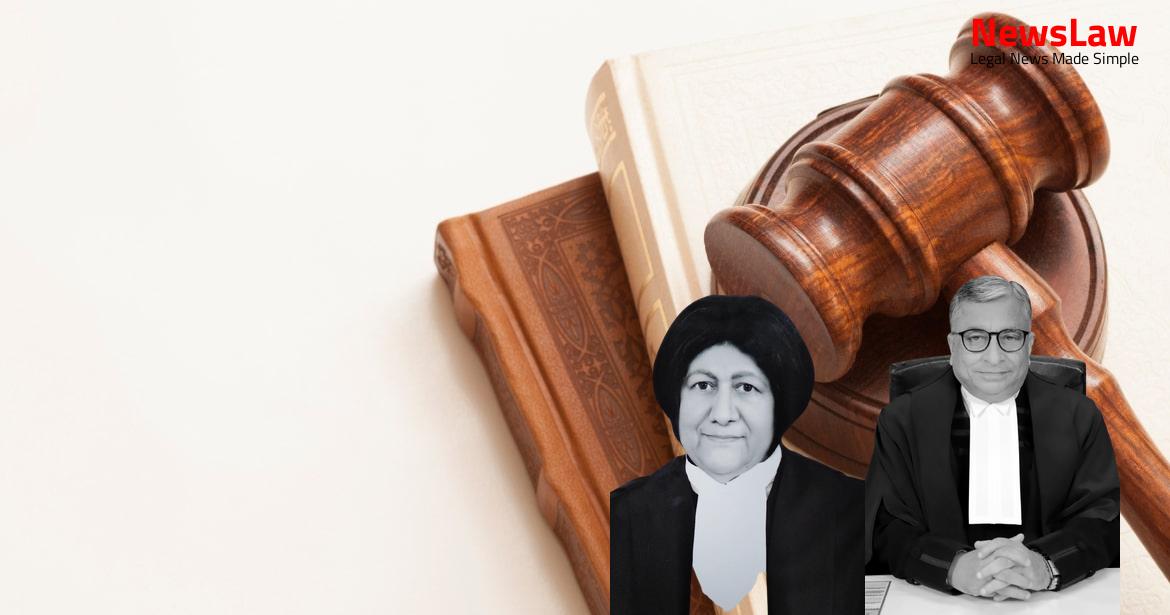The court’s legal analysis highlights the significance of encouraging genuine settlements in matrimonial disputes. Emphasizing the importance of amicable resolutions, the court’s approach aims to promote harmony and prevent unnecessary legal battles. By underlining the value of peaceful settlements and leveraging its inherent powers to secure justice, the court sets a precedent for fostering cooperative solutions in marital discord cases.
Facts
- The High Court observed that the petitioner-husband and the wife-opposite party No. 02 have amicably settled their discord and are leading a happy conjugal life.
- The Court expressed concern that continuing the proceedings might lead to bitterness and disharmony in the conjugal life of the parties.
- The judgment passed in Criminal Appeal No. 10 of 2019 by the Sessions Judge, Gumla, and the judgment passed in GR Case No. 904 of 2014 by the Judicial Magistrate, First Class, Gumla, are affirmed with a modification of sentence.
- The petitioner is sentenced to the period of custody already undergone by him.
- The High Court disposed of the case with a modification of the sentence, ensuring that both parties continue to enjoy a happy conjugal life.
- The appellant’s appeal was dismissed by the Sessions Judge, Gumla on 30.05.2019.
- A revision petition was filed by the appellant before the High Court, marked as Criminal Revision No 910 of 2019.
- Both parties were initially residing together with love and affection with no disputes between them.
- The appellant joined the Indian Army as Naik on 12.09.2005 and was convicted while affirming his conviction.
- The appellant and respondent No 2 were married on 25.05.2013.
- The High Court considered the submissions of the parties stating that they had resolved their marital discord and were currently residing together in a happy conjugal life.
- The High Court ordered a modification of the sentence to the period of imprisonment already served by the appellant.
- The respondent No 2 had lodged an FIR against the appellant and his family members with allegations of dowry demands and torture.
- All accused persons were acquitted of charges under Sections 417, 34 IPC.
- Charges were framed for offences under Sections 498-A, 323, 417, 34 IPC, with the appellant being sentenced to three years of simple imprisonment.
- The competent authority sanctioned the dismissal of the appellant from military service for being convicted under Section 498-A IPC.
- The appellant and respondent No 2 submitted a joint application to the High Court on 24.11.2020, stating they had resolved all their disputes with the help of family members and relatives.
Also Read: Dismissal of Contempt Petition: Legal Analysis
Arguments
- High Court did not consider the impact of maintaining the appellant’s conviction under Section 498-A IPC
- Maintaining the conviction could lead to financial distress for the family and harm the harmony of the parties
- Both parties have resolved their disputes and are living together happily
- High Court should encourage genuine settlement of matrimonial disputes as per B.S. Joshi and Others v. State of Haryana and Another (2003) 4 SCC 675
Also Read: Legal Analysis on Alleged Multiple Agreements in Property Sale Case
Analysis
- The court emphasizes the importance of encouraging genuine settlements of matrimonial disputes.
- The objective of Chapter XX-A of the Penal Code, 1860 is not to prolong legal proceedings but to prevent torture of women.
- Matrimonial disputes often escalate unnecessarily, leading to heinous crimes and involving elders of the family.
- The court believes that parties should aim to settle disputes amicably rather than engaging in prolonged legal battles.
- The court highlights the significance of marriage as a sacred ceremony meant for peaceful settlement.
- The inherent powers of the High Court can be used to quash criminal proceedings, FIR, or complaints.
- Section 320 of the Code does not limit or affect the powers under Section 482 of the Code.
- The settlement terms included the appellant nominating respondent No 2 as the nominee in his service record.
- The parties involved are leading a happy conjugal life.
- The High Court should have accepted the settlement and quashed all proceedings against the appellant.
- Section 498-A aims to punish a husband and his relatives for harassing or torturing the wife to fulfill dowry demands.
- The intention is to protect women from dowry-related abuse and coercion.
- This section was added to the Indian Penal Code to address and deter dowry harassment.
- The order of conviction of the appellant is set aside.
- The course of action is inclined towards securing the ends of justice.
Also Read: Legal Analysis: Excise Duty Imposition and Negligence in Fire Incident
Decision
- The appeal has been allowed.
- Proceedings arising from FIR No. 204 of 2014 are quashed for the appellant.
- I.A. No. 6052 of 2020 in Criminal Revision No. 910 of 2019 is allowed.
Case Title: RAJENDRA BHAGAT Vs. THE STATE OF JHARKHAND (2022 INSC 6)
Case Number: Crl.A. No.-000002-000002 / 2022



